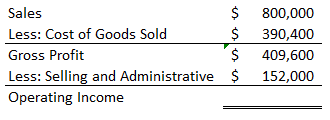
Compassion and kindness are both inherently human traits, but cannot be programmed into even the best AI. Voice cloning has also become an issue, with criminals leveraging AI-generated voices to impersonate other people and commit phone scams. These examples merely scratch the surface of AI’s capabilities, so it will only become harder for local and national government agencies to adjust and keep the public informed of the latest AI-driven threats.
Personalisation
From the moment you wake up to check your smartphone to watching another Netflix-recommended movie, AI has quickly made its way into our everyday lives. According to a study by Statista, the global AI market is set to grow up to 54 percent every single year. There are tons of advantages and disadvantages to artificial intelligence, which we’ll discuss in this article. Widening socioeconomic inequality sparked by AI-driven job loss is a beginner’s guide to vertical analysis in 2021 another cause for concern, revealing the class biases of how AI is applied.
- This transformation of the job market can create challenges in workforce planning and education to meet evolving industry needs.
- And the hypothetical future issues include things like AI programmed for harm, or AI developing destructive behaviors.
- Additionally, the proprietary nature of many AI algorithms can limit transparency and public scrutiny, making it challenging to assess their fairness, accuracy, and overall impact on society.
- Applications of AI include diagnosing diseases, personalizing social media feeds, executing sophisticated data analyses for weather modeling and powering the chatbots that handle our customer support requests.
- This not only helps in providing timely treatment but also reduces the likelihood of human error in diagnosis.
Brown launches online master’s degree in data science with a focus on policy and governance
The report, released on Thursday, Sept. 16, is structured to answer a set of 14 questions probing critical areas of AI development. The questions were developed by the AI100 standing committee consisting of a renowned group of AI leaders. The committee then assembled a panel of 17 researchers and experts to answer them. ” Other questions address the major risks and dangers of AI, its effects on society, its public perception and the future of the field.
Impact on Employment
Experts also credit AI for handling repetitive tasks for humans both in their jobs and in their personal lives. As more and more computer systems incorporate AI into their operations, they can perform an increasing amount of lower-level and often boring jobs that consume an individual’s time. Everyday examples of AI’s handling of mundane work include robotic vacuums in the home and data collection in the office. Artificial intelligence (AI) refers to the convergent fields of computer and data science focused on building machines with human intelligence to perform tasks that would previously have required a human being.
To get the most out of this promising technology, though, some argue that plenty of regulation is necessary. While AI algorithms aren’t clouded by human judgment or emotions, they also don’t take into account contexts, the interconnectedness of markets and factors like human trust and fear. These algorithms then make thousands of trades at a blistering pace with the goal of selling a few seconds later for small profits. Selling off thousands of trades could scare investors into doing the same thing, leading to sudden crashes and extreme market volatility. Join over thousands of organizations that use Creately to brainstorm, plan, analyze, and execute their projects successfully. Moving forward, the panel concludes that governments, academia and industry will need to play expanded roles in making sure AI evolves to serve the greater good.

AI boosts productivity, drives innovation, and reshapes job markets by automating tasks and creating new tech roles. AI enhances education by personalizing profit center: characteristics vs a cost center with examples learning experiences and improving administrative efficiency. One of the most significant benefits of Artificial Intelligence is that it can significantly reduce errors and increase accuracy and precision.
AI systems can detect unusual activities, recognize faces, and identify potential security threats in real time, enabling quick responses posting definition and meaning to prevent incidents and enhance safety. It enhances fraud detection and prevention by analyzing transaction patterns and identifying anomalies that may indicate fraudulent activities. Machine learning algorithms can detect unusual behavior and flag suspicious transactions in real time, allowing organizations to take immediate action. AI’s ability to learn from new data continuously improves its accuracy in identifying and preventing fraud. An example is online customer support chatbots, which can provide instant assistance to customers anytime, anywhere. Using AI and natural language processing, chatbots can answer common questions, resolve issues, and escalate complex problems to human agents, ensuring seamless customer service around the clock.
But they also enable individuals to produce software code without having to know how to code. Johnson said organizations benefit here, too, as they can use AI to collect, catalog, archive and then retrieve institutional knowledge held by individual workers, thereby ensuring it is accessible to others. He highlighted how generative AI (GenAI) tools, such as ChatGPT and AI-based software assistants such as Microsoft’s Copilot, can shave significant time off everyday tasks. Similarly, AI itself does not have any human emotions or judgment, making it a useful tool in a variety of circumstances.
Companies should consider whether AI raises or lowers their confidence before introducing the technology to avoid stoking fears among investors and creating financial chaos. The financial industry has become more receptive to AI technology’s involvement in everyday finance and trading processes. As a result, algorithmic trading could be responsible for our next major financial crisis in the markets.
AI-driven customer service chatbots can handle most customer inquiries, reducing the need for large call center teams. For instance, many e-commerce companies use chatbots to answer common questions, process orders, and provide shipping updates, significantly reducing the workload on human agents. In our daily work, we perform many repetitive tasks, such as checking documents for flaws and mailing thank-you notes. Artificial intelligence may efficiently automate these menial chores and even eliminate « boring » tasks for people, allowing them to focus on being more creative. An example is AI-powered recruitment systems that screen job applicants based on skills and qualifications rather than demographics. This helps eliminate bias in the hiring process, leading to an inclusive and more diverse workforce.
